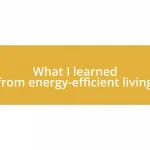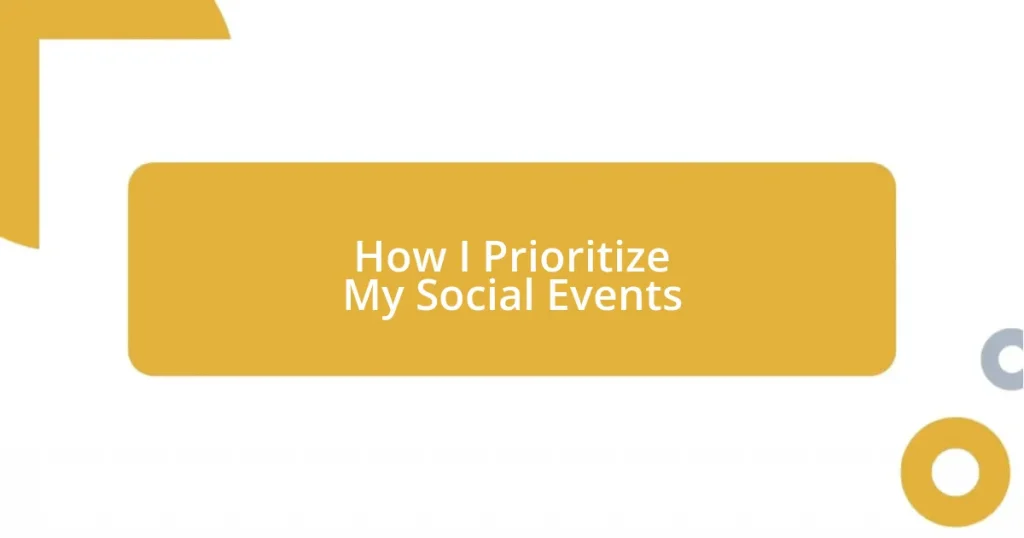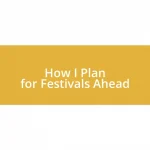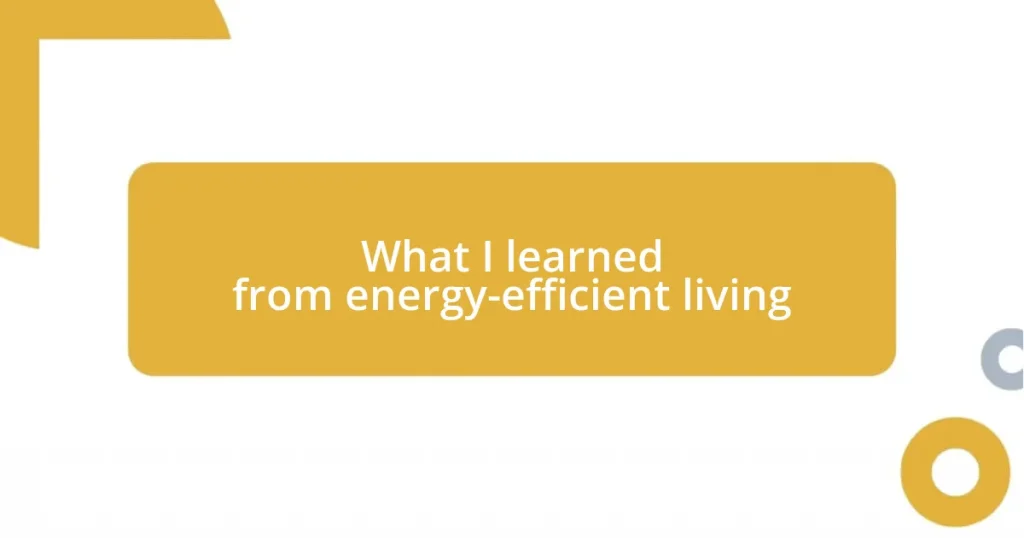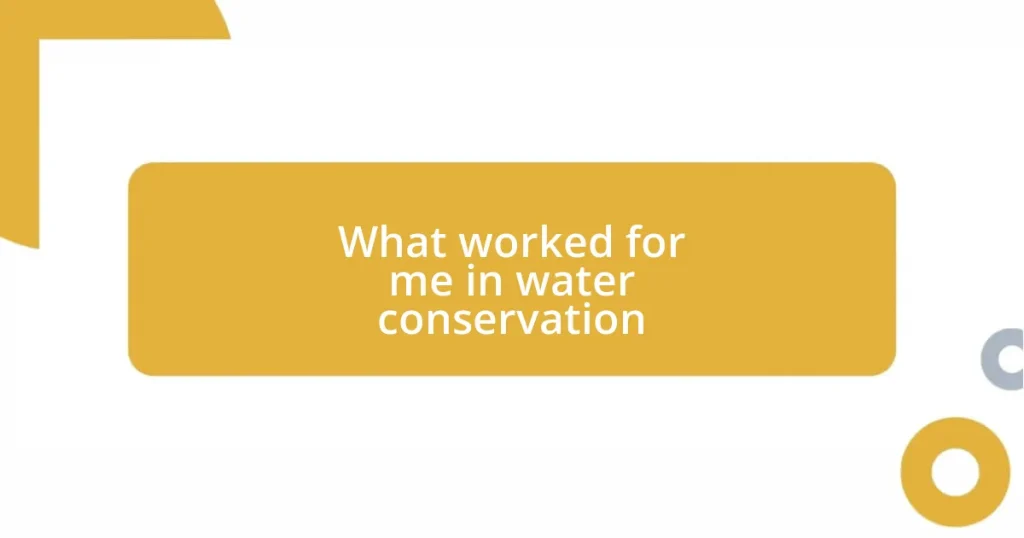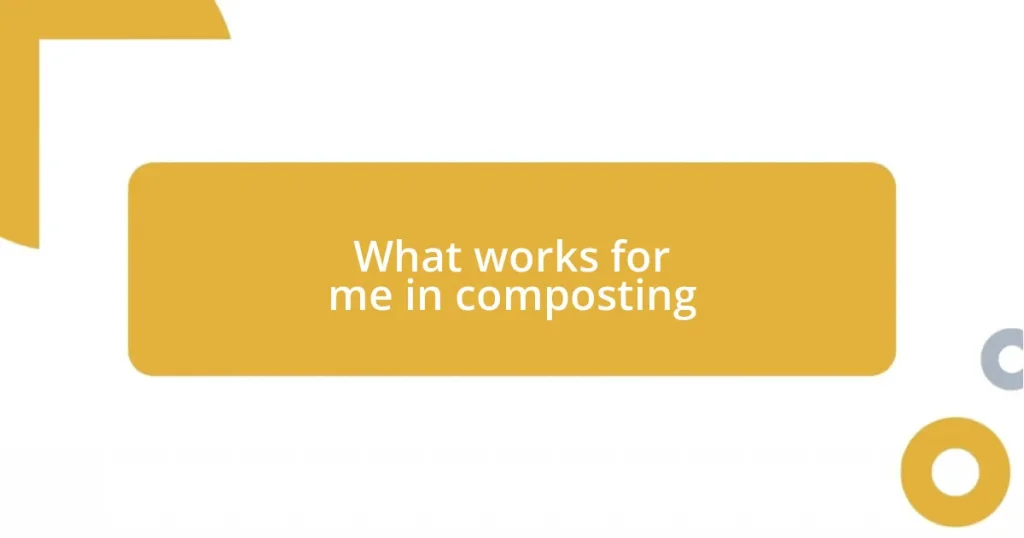Key takeaways:
- Understanding and prioritizing social commitments enhances personal well-being, balancing social interactions with self-care.
- Establishing criteria for evaluating event relevance helps in discerning valuable relationships and opportunities from obligatory engagements.
- Setting limits on time and energy dedicated to social events ensures meaningful connections and prevents overwhelm.
- Reflecting on past social engagements fosters awareness of personal needs, guiding future choices for a fulfilling social calendar.

Understanding My Social Calendar
Understanding my social calendar is essential for balancing friendships and personal time. I remember a time when I double-booked myself for a weekend, feeling torn between an old friend’s birthday and a family gathering. That chaos taught me the value of clarity—knowing exactly what I have scheduled allows me to appreciate each moment fully.
Every month, I take a moment to sit down and review my upcoming events. I often ask myself, “What truly matters to me this month?” This reflection prompts me to prioritize gatherings that strengthen connections with loved ones while leaving room for quiet evenings when I simply need to recharge. It’s about finding that sweet spot where socializing meets self-care.
I also keep a digital calendar that sends me reminders, which helps me visualize my commitments. Whenever I see a packed week ahead, I can’t help but feel a mix of excitement and anxiety. I wonder if I’ll have enough energy for it all. This insight pushes me to balance leisure and obligation, ensuring that my social events enrich rather than overwhelm my life.

Identifying Key Social Priorities
Identifying my key social priorities often requires me to take stock of what relationships matter most at any given time. I think back to a period when I was juggling numerous social commitments, and I realized that some events felt obligatory rather than enjoyable. It hit me then that not every invitation deserved a spot on my calendar, leading me to focus on the connections that genuinely add value to my life.
Here are some criteria I consider when identifying my key social priorities:
- Emotional Connection: Do I feel excited about this person or event?
- Long-term Relationships: Am I nurturing friendships that require attention?
- Personal Growth: Will this gathering offer me new insights or experiences?
- Timing & Energy: Is this social event at a time I can genuinely engage without feeling drained?
- Balance: Am I allowing time for self-care while enjoying social interactions?
These questions guide me, helping me discern which events will bolster my well-being and which might leave me feeling stretched too thin.

Evaluating Event Relevance
Evaluating the relevance of each social event in my calendar can often unfold as a mini self-exploration session. For instance, I once hesitated about attending a large networking event. I asked myself whether the connections I’d make would lead to opportunities aligning with my current goals or if I’d just be navigating small talk in a sea of faces. In the end, that clarity helped me decide to prioritize an intimate dinner with a friend whose support means the world to me, reminding me that meaningful moments often outweigh the more fleeting ones.
As I review my social events, I weigh their potential impact on my well-being. I remember a time when I felt pressured to join every party, thinking they defined my social worth. However, after reflecting on the kind of energy I want in my life, I placed greater value on events that fed my soul rather than just my social calendar. Now, I actively seek out gatherings that truly resonate with my passions and personal growth, creating a calendar that reflects authentic joy and connection.
In evaluating event relevance, I always consider the broader picture. I ask myself, “How does this event fit into my life right now?” One summer, I declined an elaborate wedding invitation in favor of spending quality time with my children at a local festival. The laughter and warmth we shared that day were unforgettable. It dawned on me that social events should uplift us, not overwhelm us—a guiding principle that stays with me as I plan my calendar.
| Criteria for Evaluating Relevance | Questions to Consider |
|---|---|
| Emotional Connection | Does this event excite me? Will it energize or drain me? |
| Impact on Relationships | Will this strengthen a key relationship or simply fulfill an obligation? |
| Personal Growth Opportunities | Will I learn something valuable or gain new perspectives? |
| Timing & Energy Level | Am I able to be fully present, or will I feel rushed or tired? |
| Long-term Value | Does this event contribute to my goals or long-term happiness? |

Setting Time and Energy Limits
Setting time and energy limits is a crucial part of managing my social calendar. I remember a weekend where I had three back-to-back events lined up. By the second gathering, I felt so drained that I couldn’t fully engage with my friends, and that memory stuck with me. Now, I consciously allocate only a couple of events per week to preserve my energy and enjoy the company without feeling overwhelmed.
It’s interesting how setting these limits not only protects my well-being but also enhances the quality of my interactions. Recently, I chose to skip a big party to spend a quiet evening at home, reflecting and recharging. I felt a wave of relief wash over me when I realized I could prioritize rest without guilt. When I balance my social life with personal time, I’m often more present and engaged when I do step out into social settings.
I often ask myself, “What’s my energy level like today?” and “Will this event energize me or deplete me?” One summer, I planned a series of Saturday brunches but quickly learned that a packed schedule left little room for spontaneity or downtime. Now, I leave open spaces on weekends. This way, if I feel social, I can reach out and make spontaneous plans, or if I need rest, I don’t have to cancel anything. Setting these limits has led to a more satisfying and meaningful social life overall.

Balancing Personal and Social Life
When I think about balancing my personal and social life, the first thing that comes to mind is the importance of intentionality. I remember a time when I’d mindlessly accept every invitation, leaving me feeling more like a socialite than someone truly engaged in my life. This realization hit hard one evening when I found myself attending a gathering that brought me no joy. That night, I learned that it’s crucial to align my social choices with my inner needs rather than just filling my calendar with events.
Mindfulness plays a significant role in how I navigate personal versus social time. Just last month, I was invited to a friend’s birthday bash, but I was also in the middle of a project that required my focus. Instead of feeling guilty for declining, I chose to dedicate that evening to my passion for painting, which was both fulfilling and therapeutic. In my experience, prioritizing activities that enrich my personal growth brings a profound sense of balance and fulfillment.
I’ve also found that regular self-check-ins are necessary to keep this balance intact. Whenever I feel overwhelmed, I take a moment to ask myself, “What do I really need right now—social interaction or solitude?” There was that one frustrating week when my schedule was packed, leaving no room for self-care. I eventually realized that saying no to a few engagements was liberating. This shift allowed me to cherish the rare moments of peace and focus on nurturing myself without the nagging feeling of letting someone down. Finding that equilibrium has made a world of difference.

Using Tools for Scheduling
Using digital tools for scheduling has completely transformed how I manage my social events. Whether it’s Google Calendar or a simple notes app, having the ability to visualize my commitments helps me gauge my availability. I still remember feeling overwhelmed by my plans, so now, I color-code my events based on their energy demands. It’s a simple trick, but it visually cues me to balance my week and avoid overcommitting.
I also rely heavily on reminder apps, especially when I’m juggling multiple social gatherings in one week. There was that one time I completely forgot about a friend’s dinner because it wasn’t on my radar. Since then, I’ve made it a point to set reminders not just for the event, but also for prep time. It’s surprising how these small nudges prevent stress and make me feel more in control. With tailored notifications, I find that I can approach each event with enthusiasm instead of last-minute panic.
Moreover, collaborative scheduling tools like Doodle have become my go-to for planning with friends. Everyone has busy schedules, and trying to pick a day can feel like herding cats! I recall one time when my group of friends tried to find a date for a weekend trip. Using Doodle saved us hours of back-and-forth texting and made planning enjoyable. I’ve learned that leveraging these tools not only simplifies scheduling but also fosters a sense of collective excitement as we coordinate our social dreams. This way, I not only stay organized; I also get to nurture friendships in the process.

Reflecting on Social Engagements
Reflecting on my social engagements often reveals more than just what I’ve done; it sheds light on how I’ve felt throughout those experiences. I can remember a time when I eagerly attended a networking event, only to leave feeling drained instead of inspired. Why do I put myself in environments that don’t uplift me? Through this reflection, I’ve learned to evaluate not just the events I accept but also the energy those gatherings bring to my life.
Sometimes, I find that my thoughts wander to the people I’ve been around and how they resonate with my values. For instance, after reconnecting with an old friend during a casual get-together, I realized how much I craved those deep conversations. This reminded me that I need to not only prioritize events but also the company I keep. When I reflect on these interactions, I ask myself, “Am I feeling open and energized, or am I holding back?” These questions guide my choices and help me create a more fulfilling social calendar.
Looking back helps me acknowledge patterns in my social life that I might overlook in the rush of daily commitments. For example, I’ve noticed that after several weekends filled with large gatherings, I often crave quieter, more intimate settings. It’s like a pendulum swing between social stimulation and personal reflection. Each time I assess this balance, I come to appreciate the blend of experiences that truly nourish my well-being. This reflection process becomes a compass that directs my social choices for a more balanced life.
